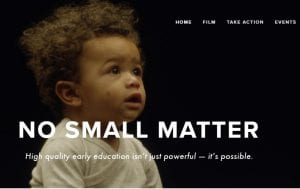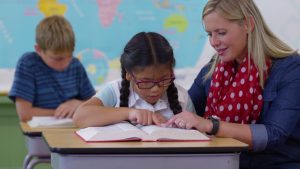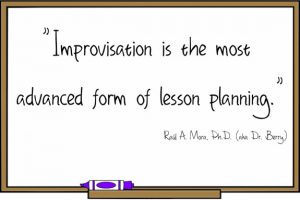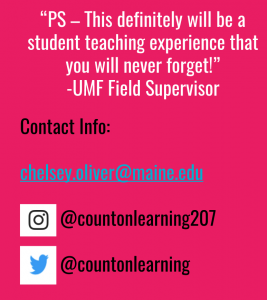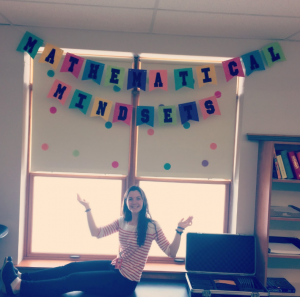Maine is facing a demographic dilemma- the population is growing older, and workers are retiring at rates higher than new employees are entering the field. Maine needs to develop a strong workforce to help ensure that employers can continue to thrive. Live and Work in Maine is an initiative to recruit hard working individuals from across the country and the world to live in the beautiful state of Maine.
With Live and Work in Maine, you can search for places to live or places to work, and the other will follow.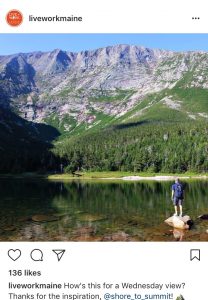 If you care more about living in the mountains than anything else, they can help you find the perfect location and then a job to follow. If you are willing to live on the beach, in the woods, or in the city- wherever it takes to get you your dream job- then Live and Work in Maine can help you find that job and then a place to live from there. “Our mission is to show the world that in Maine, you can have it all when it comes to quality of life AND quality of career.”
If you care more about living in the mountains than anything else, they can help you find the perfect location and then a job to follow. If you are willing to live on the beach, in the woods, or in the city- wherever it takes to get you your dream job- then Live and Work in Maine can help you find that job and then a place to live from there. “Our mission is to show the world that in Maine, you can have it all when it comes to quality of life AND quality of career.”
So, how do you go about finding the perfect place to live? You can search for a location based on three different categories:
Region– the various regions of Maine that are listed include: Aroostook County, Downeast & Acadia, Maine Lakes & Mountains, Kennebec Valley, Maine Highlands, Midcoast, Greater Portland & Casco Bay, and Maine Beaches
Lifestyle– if there are certain hobbies, sceneries, structures, or population density that you prefer, you can 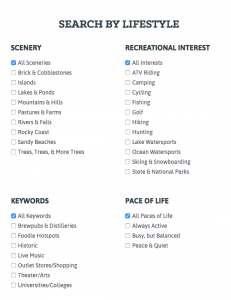 filter for them! Various lifestyle choices listed include (but are not limited to): lakes & ponds, bricks and cobblestone, “trees, trees, & more trees”, camping, fishing, golf, hunting, ski/snow sports, historic, live music, shopping, theatre/arts, always active, peace & quiet, etc. It is easy to find something for everyone!
filter for them! Various lifestyle choices listed include (but are not limited to): lakes & ponds, bricks and cobblestone, “trees, trees, & more trees”, camping, fishing, golf, hunting, ski/snow sports, historic, live music, shopping, theatre/arts, always active, peace & quiet, etc. It is easy to find something for everyone!
Career– You can also search for regions/areas that have available jobs that meet specific filters, such as job industry, region, employer size, internships, seasonal jobs, and entry level jobs.
How do you go about finding your dream job in Maine? Jobs and internships can also be searched for and explored in a couple of ways:
Job Board– on the Job Board page you can search for jobs by keyword, job title or specific location. Jobs can be filtered by type, geographic region, and industry. The Job Board also lists job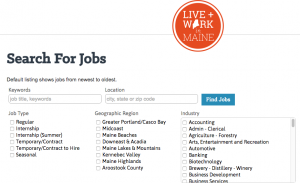 postings with job title, employer name and location, description of job, and links to apply, view the employer profile, and save the job posting. See a job that your friend would be perfect for? There is also an option to share the job info with a friend! What better way to find your dream job and move to Vacationland than to do it with a friend?
postings with job title, employer name and location, description of job, and links to apply, view the employer profile, and save the job posting. See a job that your friend would be perfect for? There is also an option to share the job info with a friend! What better way to find your dream job and move to Vacationland than to do it with a friend?
Explore Employers– The Explore Employers page allows for you to search for employers based on employer name, career, and lifestyle. Each employer profile includes brief description, location information, and contact info to get in touch with the employer.
 Live and Work in Maine strives to help individuals relocate to an area they will love, and work in a position that will allow them to thrive. The Live and Work in Maine Instagram page (@liveworkmaine) includes an abundance of pictures exhibiting the various lifestyles and hobbies that can be lived in Maine.
Live and Work in Maine strives to help individuals relocate to an area they will love, and work in a position that will allow them to thrive. The Live and Work in Maine Instagram page (@liveworkmaine) includes an abundance of pictures exhibiting the various lifestyles and hobbies that can be lived in Maine.
Foodies, hikers, adventurers, writers, artists, entrepreneurs, and everyone else is sure to find somewhere and something they love in Maine. Find what you love, and find it in Maine.
